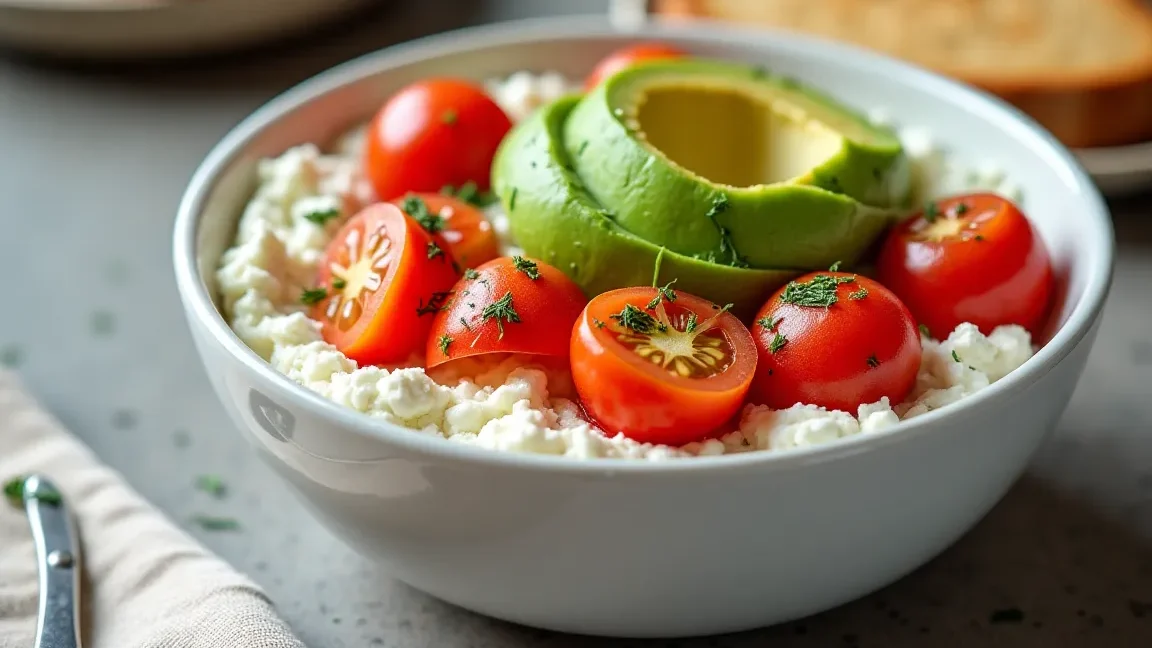Table of Contents
Breakfast holds a unique place in the world of nutrition it’s not just a meal but an opportunity to energize your body and mind for the day ahead. A balanced meal, such as cottage cheese for breakfast, helps stabilize blood sugar levels, kick-start metabolism, and enhance focus, making it an essential component of a healthy lifestyle. Yet, in today’s fast-paced world, convenience often precedes variety and balance, leading many to search for quick, nutrient-packed options like cottage cheese.
Cottage cheese, with its creamy texture, high protein content, and versatile flavor, has become a go-to choice for individuals seeking a simple yet satisfying breakfast. Whether you enjoy it sweetened with fruit, seasoned with savory toppings, or straight out of the container, cottage cheese offers a wealth of nutrients in every bite.
But can this dairy delight stand alone as a complete breakfast? This article explores the nutritional benefits of cottage cheese, its potential limitations as a solo morning meal, and how to optimize its role in your breakfast routine. By examining the pros and cons, we’ll uncover whether cottage cheese truly has what it takes to fuel your day.
The Nutritional Powerhouse of Cottage Cheese
Cottage cheese has earned its reputation as a nutritional powerhouse, making it a standout choice for breakfast or any meal. Packed with essential nutrients, it provides various benefits that support overall health, energy, and weight management. Let’s dive deeper into why cottage cheese deserves a spot on your plate.
High Protein Content and Its Benefits
Protein is the star macronutrient in cottage cheese, making it a favorite among health-conscious individuals and fitness enthusiasts. A single cup of cottage cheese contains approximately 25–30 grams of protein, depending on the variety. This is over half the recommended daily intake for many adults in just one serving!
Protein in cottage cheese offers several key benefits:
- Sustained Energy: Protein slows digestion, helping maintain steady energy levels throughout the morning.
- Satiety: High-protein foods keep you feeling full longer, reducing the likelihood of mid-morning hunger pangs.
- Muscle Repair and Growth: Whether you’re an athlete or just starting a fitness journey, the amino acids in cottage cheese help repair and build muscle tissue.
- Weight Management: Protein-rich foods like cottage cheese support weight loss by reducing overall calorie intake and promoting fat loss while preserving muscle.
For weight-conscious individuals, cottage cheese is a valuable ally. Dive deeper into Can I Eat Cottage Cheese for Breakfast? to understand if it can stand alone as a complete meal.
Vitamins and Minerals: Calcium, Phosphorus, B12
Cottage cheese isn’t just about protein; it’s also a rich source of essential vitamins and minerals that contribute to optimal health:
- Calcium: Critical for maintaining strong bones and teeth, calcium also plays a role in muscle function and nerve signaling. Cottage cheese offers a significant portion of your daily calcium needs.
- Phosphorus: This mineral works alongside calcium to support bone health and plays a key role in energy production at the cellular level.
- Vitamin B12: Vital for brain function, nerve health, and the production of red blood cells, vitamin B12 is abundant in cottage cheese, making it a particularly valuable food for individuals who consume limited meat.
To explore creative ways to enhance these benefits, check out How to Jazz Up Cottage Cheese for unique and tasty ideas.
Low-calorie and Fat Options Available
Another appealing feature of cottage cheese is its adaptability to different dietary needs. Whether you’re managing your calorie intake or looking for a source of healthy fats, cottage cheese offers options for everyone:
- Low-Fat or Non-Fat Varieties: Perfect for calorie-conscious individuals, these options provide all the protein and nutrients with minimal fat.
- Full-Fat Varieties: These offer a creamier texture and provide healthy fats that can keep you feeling fuller for longer. Full-fat versions are particularly great for those following low-carb or ketogenic diets.
Cottage cheese is a perfect fit for those seeking high-protein, low-calorie options. Discover Top Cottage Cheese Breakfast Recipes for a Healthy Start for inspiration on incorporating it into your morning.
Benefits of Eating Cottage Cheese for Breakfast

Cottage cheese is not just a nutritious addition to your diet it’s also a convenient and versatile breakfast option. Its unique qualities appeal to those who value health, flavor, and efficiency in their morning routines. Let’s explore the key benefits of eating cottage cheese for breakfast.
Weight Management Support
One of cottage cheese’s standout benefits is its role in weight management. Its high protein and low-calorie profile make it a valuable food for anyone looking to lose or maintain weight.
- Promotes Satiety: Cottage cheese is rich in protein, which helps you feel fuller for longer. This reduces the likelihood of snacking or overeating later in the day.
- Supports Muscle Maintenance: For those on a calorie-restricted diet, cottage cheese helps preserve lean muscle mass, essential for maintaining metabolism during weight loss.
- Low in Calories: A typical serving of low-fat cottage cheese provides approximately 200 calories, making it a satisfying and calorie-conscious choice for breakfast.
Easy and Quick to Prepare
In our fast-paced society, efficiency is essential, and cottage cheese is a great source of that. It doesn’t require cooking, which makes it the perfect choice for hectic mornings.
- Ready-to-Eat: Cottage cheese can be eaten straight out of the container, saving valuable time during hectic mornings.
- Minimal Prep: Whether you pair it with fruits, vegetables, or seeds, preparing a nutritious meal with cottage cheese takes just a few minutes.
- Portable: It’s easy to pack and carry, making it an excellent choice for breakfast on the go.
Versatility: Sweet or Savory Options
One of the reasons cottage cheese is so beloved is its versatility. Its mild flavor allows it to pair equally well with sweet or savory ingredients, offering endless possibilities for customization.
- Sweet Pairings: Top with berries and bananas. Is Honey Good on Cottage Cheese? for natural sweetness.
- Savory Options: Pair cottage cheese with avocado, cherry tomatoes, cucumbers, or even smoked salmon for a prosperous, delicious start to the day. Herbs and spices like black pepper, paprika, or dill add extra layers of flavor.
- Culinary Creativity: The cottage cheese can be turned into parfaits, smoothies, spreads, and even pancake batter, providing a variety of breakfast options.
C cottage cheese stands out as a breakfast option that checks all the boxes by supporting weight management, offering unmatched convenience, and accommodating diverse flavor profiles. Whether you prefer sweet or savory, simple or elaborate, cottage cheese can effortlessly adapt to your needs and tastes.
Can Cottage Cheese for Breakfast Alone Be a Balanced Meal?
Cottage cheese is unquestionably healthy. However, balanced eating is essential for breakfast in the morning. Although it’s high in protein content and supplies essential minerals and vitamins, eating cottage cheese alone may not meet all the nutritional requirements for an adequate meal. Let’s look at why eating cottage cheese on its own may fall short.

Macronutrient Composition
Breakfast replenishes the body’s energy stores after an overnight fast. Ideally, it should include a balanced mix of macronutrients protein, carbohydrates, and fats. Cottage cheese excels in protein and can be a moderate source of fats if you choose full-fat varieties, but it lacks a significant amount of carbohydrates.
Carbohydrates are crucial for quick energy, especially in the morning when glycogen levels are naturally lower. Without carbohydrates, your body may struggle to maintain optimal energy levels, potentially leading to fatigue or brain fog.
Low Carbohydrate Content
A cup of cottage cheese contains only a few grams of carbohydrates, making it insufficient as the primary energy source for most people. While low-carb dieters may find this appealing, others might need additional sources of carbohydrates to feel fully energized.
Lack of Fiber
Fiber is essential for maintaining digestive health, stabilizing blood sugar levels, and promoting long-lasting satiety. Unfortunately, cottage cheese is nearly devoid of fiber. Consuming fiber-rich foods with cottage cheese can help create a more complete meal that supports overall gut health and keeps hunger at bay.
Potential Nutrient Gaps
While cottage cheese provides abundant protein, calcium, and vitamin B12, it lacks other critical nutrients like vitamin C, iron, and potassium. Over-relying on cottage cheese as a standalone meal can lead to nutrient gaps over time, especially if your overall diet lacks variety.
Potential Drawbacks of Cottage Cheese for Breakfast
While cottage cheese is highly nutritious and versatile, it has limitations. Depending solely on cottage cheese for breakfast or consuming it in excess may pose certain drawbacks. It’s important to consider these potential issues to make an informed choice about including cottage cheese in your diet.
High Sodium Content in Some Brands
Many commercially available brands of cottage cheese are relatively high in sodium. A typical serving can contain anywhere from 400 to 900 milligrams of sodium, a significant portion of the daily recommended intake (2,300 milligrams for most adults). Excess sodium intake can contribute to health issues such as:
- Hypertension: Increased blood pressure over time.
- Water Retention: Feeling bloated or puffy due to excess salt.
- Risk of Heart Disease: Chronic high sodium levels may elevate cardiovascular risk.
Solution: To mitigate this, opt for low-sodium or no-salt-added varieties. Checking nutrition labels can help you find brands that align with your health goals.
Unsuitability for Lactose-Intolerant Individuals
Cottage cheese can be classified as a dairy item, which means it is composed of lactose, a natural sugar that occurs in milk. For those who have lactose intolerances, eating cottage cheese could cause uncomfortable digestive issues, including:
- Bloating
- Gas
- Diarrhea
Fortunately, many stores offer lactose-free cottage cheese options. These products are treated with lactase enzymes to break down the lactose, making them easier for those with sensitivities to digest.
Risks of Over-Relying on a Single Food
Even the most nutritious foods, such as cottage cheese, shouldn’t ultimately be your diet’s sole focus. Being overly dependent on one food could cause nutritional imbalances or deficiencies. Examples:
- Fiber Deficiency: Cottage cheese lacks fiber, vital for gut health and regular bowel movements.
- Limited Micronutrient Variety: Cottage cheese is not a significant source of vitamin C, potassium, or iron, which are critical for overall health.
- Dietary Monotony: Eating the same food repeatedly can make your meals less enjoyable and lead to a lack of motivation to maintain a healthy diet.
Solution: Incorporate cottage cheese into a varied diet. Pair it with other nutrient-dense foods like fruits, vegetables, nuts, and whole grains to ensure a balanced intake of all essential nutrients.
Suppose you are aware of the potential disadvantages and taking simple steps to overcome them, allowing you to enjoy the benefits of cottage cheese while limiting its disadvantages. A balanced and varied diet is essential to lasting health and happiness.
Frequently Asked Questions (FAQ):
Is Cottage Cheese Enough for Breakfast?
Cottage cheese is a very nutritious food and a good source of calcium, protein, and vitamins for a breakfast meal. However, it is deficient in the fiber and carbohydrates that are crucial for energy production and good digestion. Pairing cottage cheese with fruits, vegetables, or whole grains can create a more balanced breakfast that meets your dietary needs.
How Much Cottage Cheese Should I Eat?
A typical serving size for cottage cheese is 1 cup, which provides approximately 25–30 grams of protein and other essential nutrients. This portion is sufficient for most individuals to feel satisfied and energized. However, you can adjust the serving size based on your caloric and macronutrient requirements.
Can Cottage Cheese Aid in Weight Loss?
Yes, cottage cheese is an excellent option to help manage weight. The protein content is high, which makes you feel fuller and more long-lasting. Furthermore, its low-calorie profile is ideal for creating a calorie deficit vital to losing weight. Choosing low-fat or non-fat varieties can reduce calorie intake while providing essential nutrients.
Quick Ideas for Cottage Cheese Breakfast
- Sweet Bowl: Top cottage cheese with fresh berries, a drizzle of honey, and chia seeds.
- Savory Bowl: Mix cottage cheese with avocado, cherry tomatoes, and a sprinkle of black pepper.
- Toast Topping: Spread cottage cheese on whole-grain toast and add sliced bananas or cucumbers.
- Smoothie Add-In: Blend cottage cheese with your favorite fruits, spinach, and a splash of almond milk for a creamy smoothie.
- Parfait: Layer cottage cheese with granola and fruit for a quick grab-and-go option.
For more creative combinations, explore What Does Cottage Cheese Mix Well With?
Conclusion
Summary of Nutritional Benefits
Cottage cheese is an excellent source of calcium, protein, and Vitamin B12, which makes it a nutritious option for breakfast. Its versatility lets it blend seamlessly with sweet or savory foods and cater to a variety of preferences and tastes.
Importance of Pairing Cottage Cheese with Other Foods for Balance
Although cottage cheese is a great source of nutrition, it is deficient in essential elements such as fiber and carbohydrates. Incorporating fruits, vegetables, seeds, nuts, or whole grains provides the proper balance of food that supplies energy, helps digestion, and eliminates food inconsistencies.
Final Recommendation for a Balanced Breakfast
Cottage cheese is an ideal base for a nutritious breakfast, but it’s best when combined with a varied and healthy meal. Combining it with other foods can build a perfect breakfast that is satisfying and aligned with your health objectives.
Ready to elevate your breakfast game? Check out Top Cottage Cheese Breakfast Recipes for inspiration.
